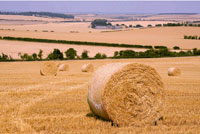‘Hay and straw prices could be 40% higher this season’

Hay and straw prices are between 20% and 40% higher than last year with big regional variations. The market is being pushed up by low silage yields, lack of any carry-over stocks and an anticipated shortage of straw from the 2010 harvest.
Latest prices from the British Hay and Straw Merchants’ Association put good quality big square bale wheat straw at £43 -£70/t ex farm, depending on location, and big square bale barley straw at £50-£80/t ex-farm. Hay prices are between £60 and £80/t ex-farm.
Straw yields will be extremely variable, making the market more difficult for both buyers and sellers to read. More livestock producers are expected to make wholecrop silage this year to supplement poor silage yields, further reducing straw availability.
The south-west of England traditionally sees some of the highest fodder prices because of the long haul from the arable east and higher livestock numbers.
Tom Mellor of auctioneer Greenslade Taylor Hunt sold 2600 acres of standing straw in Somerset last month, almost 1000 acres more than at the same sale last year. Winter wheat straw averaged £65/acre, winter barley straw £76/acre, spring barley £66/acre, winter oats £82/acre and oilseed rape straw £35/acre.
These prices are up 10% on last year but because yields could be up to 30% down, costs/tonne are effectively much higher, said Mr Mellor. He reckons sellers are unsure of how to value the crop in a heated market.
Hay and straw trader Brian Peacock, who runs six balers and buys straw across North Yorkshire, said he was looking at a very mixed bag of potential straw yields.
Mr Peacock buys straw in the swath on a £/t baled basis and says that wheat straw is costing 20-30%/t more than last year. “This year far more people are talking about leaving more straw for baling rather than chopping,” he said. But, many will only make up their minds at the last minute according to the weather.
The decision has become less clear cut since cereal prices went up early this week. Higher grain prices may push some growers back towards chopping to avoid the expense, soil compaction damage and P and K cost of baling.
Nottinghamshire and Derbyshire merchant Philip Shillitto told FW many farmers had only half the hay they would normally expect to make. He is delivering big bale hay for £100/t, about £30/t more than a year ago.
